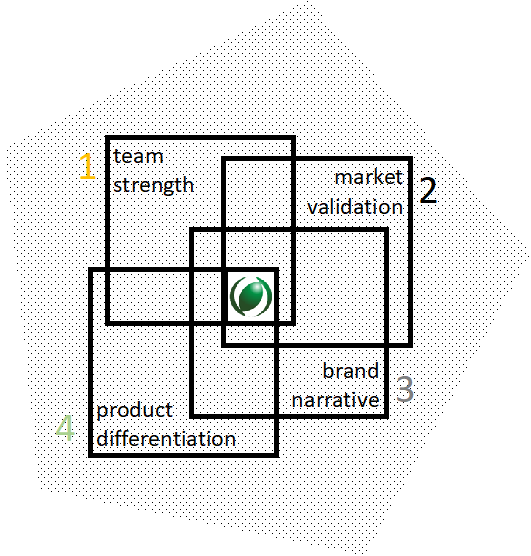Jenson Investment Thesis
An early-stage fund is constantly bombarded by entrepreneurs with ideas, projects, teams, businesses and everything in between. Yet only a small portion is appropriate for our fund. Our job is to distill a pitch deck and a few meetings into a concrete investment decision.
There isn’t a concrete set of measurable traits we look at to helps us separate great opportunities from the rest, especially at such an early stage. It’s often that, at this stage, the data available is scarce and biased. So, how do people do this?
When you look across the industry, VCs, Funds and Angels have their various investment thesis. Sometimes focus on the founders, on an idea or on a high growth industry/market. Everyone has a different take on what are the early signs of a great company are. At Jenson, after 7 years and 99 investments, we have also developed and refined a thesis. It is as follows:
Great companies show impressive characteristics in 4 areas: team strength, market validation, product differentiation and brand story. An investment should only be made on companies that are outstanding in all these areas.
We think through these constantly. The intersection of all these is the goal. Usually, the lack of one or more of these areas is the reason for the rejection of an opportunity. But a concrete thesis is not enough. It is still based on a combination of unmeasurable traits. How do we assess each company in each area? This is what this blog is intending to shine some light on.

1 – Team strength
I recall that at my first day at Jenson during one of my first meetings, a partner faced me and said: ‘we don’t invest in one-man-bands’. He added that this was not a hunch but based on our imperial evidence, over the 99 companies we have invested in, 1 person companies haven’t worked. We understand the reason behind this to be two-fold.
Firstly, no one is great at all aspects of running a company. The breadth of skills necessary to take a company through the various stages of growth is wide and everchanging. Thus, a one-person team will need complementary skill sets to leverage resources and maximize growth. The second part relates to leadership. A founder shows leadership by enlisting someone to join the project. In our view, that is the seed of great management and of a leader with vision.
The ‘strength’ of the team correlates with the distribution of skill and personalities traits. A well-balanced team has expertise across various skills and shows cognitive and emotional intelligence. In the same way, it will have a varied and relevant set of experiences to the company they are developing.
2 – Market Validation
As investors, we are information hungry. Yet it does not matter how much we can research a specific industry or target buyer. We may never relate to the specific problem or to how groundbreaking the solutions provided are. This is why we look at market validation. The market validates and idea/product by paying a price for it. Sometimes this is not possible because the product is not ready for commercial use or the buying cycle is too lengthy.
So, we try to measure the distance to the sale. The smaller the distance the better. Cold calling and asking if they would buy something is a considerable distance. Having a free proof of concept contract in place is a small distance to a sale. The distance relates to the ease of converting that lead into an actual sale. The smaller the distance to sale the better the market validation. This distance is the basis of our assessment.
3 – Brand Narrative
The Brand Story is the spine of the company, it is what supports all aspects of the business. If we go way back in time, the first form of information sharing was storytelling. People respond to captivating stories and this is why storytelling is the best way to teach.
Thus, a brand story is essential as you are teaching stakeholders about your company. A great story helps you to easily convey what the company is and what it makes, and eventually to sell the product. In essence it is what connects the team, the market and the product.
The way we measure the brand stories is a mixture from memorability and likability. Memorable stories stick with you. Likable stories help to relate to the problem and the solutions.
4 – Product differentiation
Product differentiation is a balance between groundbreaking innovation and easy familiarity. Pareto’s Principle is the basis for this idea. It states that ‘80% of results come from 20% of causes’. We translate this to ‘80% innovation must come from 20% of the features. A new product/service must have 80% of its features familiar to the user. This is to maximize the ease of use.
An example of this was the skeuomorphic design implemented by Apple when it launched the iPhone. This brought an element of familiarity to the product as the rest of it packed so much innovation. Then, 20% can be new and exciting features, that are hard to replicate and bring the USP to the product. This split is what we assess when we look at a company.
To conclude, these areas are equally important and should be equally impressive. This is our benchmark. If you believe you have all of the above please do not hesitate to get in touch (invest@jensonfunding.com). It is often the case that one of these areas is lacking. In those cases, we’ll provide you with some feedback and will leave the door open to try again in the future.
